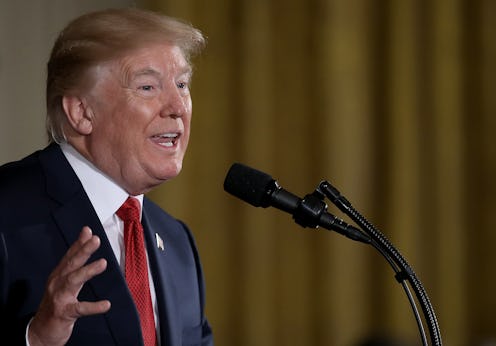News
If Trump Pardons Paul Manafort, All Hell Will Break Loose

With Joe Arpaio, Trump made clear that he is willing to exercise his presidential pardon power when necessary. After charges were brought against Paul Manafort and business associate Rick Gates Monday morning in regard to Robert Mueller's Russia probe, some observers wondered: What if Trump feels that this situation deems it necessary, too? Will Trump pardon Manafort — and what would happen if he did?
To begin to answer that question, let's dig in to exactly how a presidential pardon works. According to the Constitution:
The President … shall have Power to grant Reprieves and Pardons for Offences against the United States, except in Cases of Impeachment.
Basically, unless Trump is in the process of being impeached at the time, he has the power to pardon any person convicted of a federal crime — in short, to absolve him of responsibility for that crime and everything else that came with the conviction.
One important note: Trump's power here only extends to federal crimes, not state ones. (Technically, governors can grant pardons for state crimes; the president cannot.) However, it was a federal grand jury that indicted Manafort and Scott on charges of "conspiracy against the United States, conspiracy to launder money, unregistered agent of a foreign principal, false and misleading FARA statements, false statements, and seven counts of failure to file reports of foreign bank and financial accounts," according to the grand jury's official statement.
So, yes, Trump has the power to pardon Manafort or Scott, if they were convicted of those crimes. In fact, he could even fire Mueller, who is overseeing the probe that led to charges being brought against Manafort and Scott. (There's precedent here, too, given that Trump infamously fired former FBI director James Comey earlier this year.)
And what would happen if he did? Well, as you might imagine, there would be swift and immediate backlash against the president. To pardon Manafort would be to implicitly suggest that Trump and his associates are above the law — especially if the evidence given to the grand jury, which is as yet unclear, points firmly to Manafort colluding with Russia in the run-up to the 2016 election.
Hypothetically, if the public were to believe that Manafort colluded with Russia to get the president elected, and, once elected, the president were to absolve him of all crimes, it's no stretch to suggest that Trump's approval ratings would tank and public trust in him erode. In addition, members of Congress may use the pardon as a reason to seek to impeach Trump — particularly if Democrats take control of the House or Senate after the 2018 midterms, and are thus more likely to succeed.
There could also be legal ramifications, much as with Trump's attempted travel ban. Aaron Rappaport, a professor at University of California Hastings College of the Law, wrote in an op-ed for The Hill:
Although it is not widely recognized, constitutional constraints on the president’s authority mean that any pardon Manafort is likely to receive would almost assuredly not survive federal court review.
However, Sean Illing at Vox spoke to a number of legal experts to ask about what could occur if Trump pardons central figures in the Russia investigation, like Manafort and Kushner, concluding:
Nearly all the experts I spoke to agree on one thing: If Trump does use his pardoning powers to thwart the Russia investigation, it's very likely to backfire.